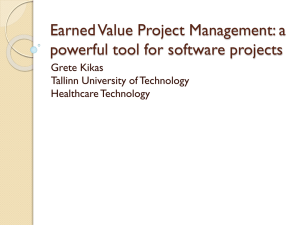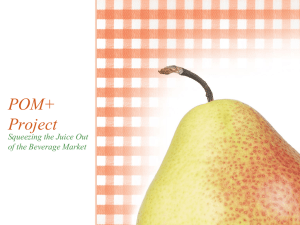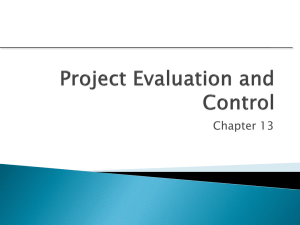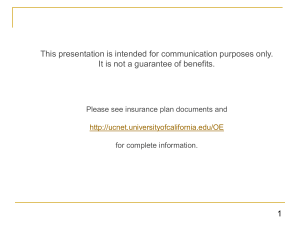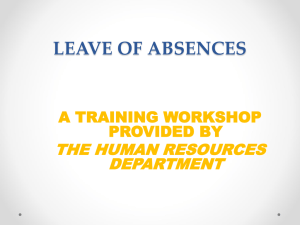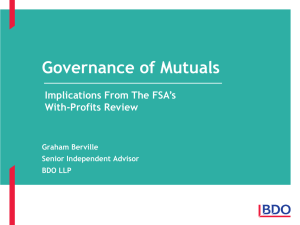PPT
advertisement
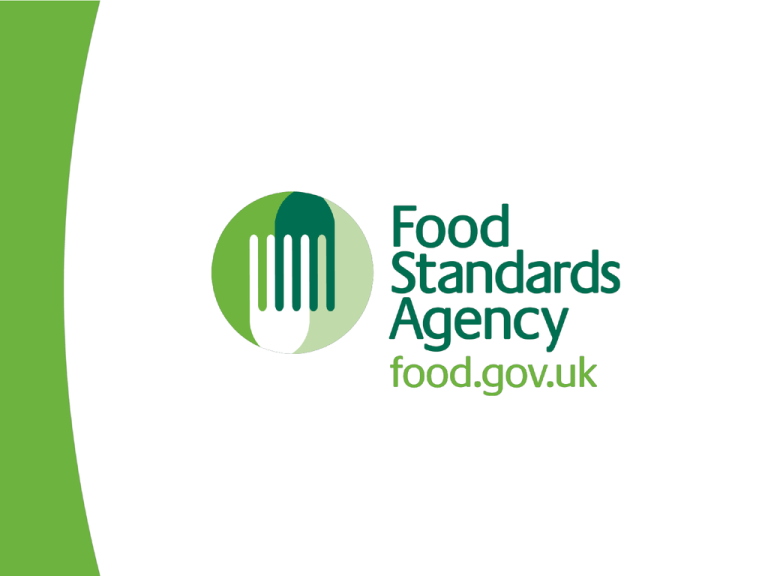
Earned Recognition: Primary Authority and Third Party Assurance Schemes Sharon Egan, Enforcement Strategy and Research, Enforcement and Local Authority Division 2 Compliance and Enforcement Strategy • Developing a strategic approach to support implementation and set enforcement priorities in the revised FSA Strategy 2010-2015 • Aim is consistent approach to compliance and enforcement across foodchain by all regulators • Clearer direction and leadership. 4 Compliance and Enforcement Strategy • Key Principles – Target interventions on areas where there is higher risk – More emphasis tackling non-compliance – Greater recognition of business’ own means of securing compliance – Increased transparency of standards – Use of wider incentives and penalties that drive compliance – Consistent risk based controls across foodchain 5 The Government's strategy is to: • remove or simplify existing regulations that unnecessarily impede growth • reduce the overall volume of new regulation by introducing regulation only as a last resort • improve the quality of any remaining new regulation • move to less onerous and less bureaucratic enforcement regimes where inspections are targeted and risk-based • In April 2010, the Prime Minister said: "I want us to be the first government in modern history to leave office having reduced the overall burden of regulation, rather than increasing it." The Strategy Themes: Overview Assessing risk Changing FBO behaviour • Improved overview and understanding of risks associated with Food Businesses • Improved risk based regulation • Current approach based on monitoring, education and support can be enhanced through better targeting • An understanding of drivers of compliance in businesses and making greater use of these in our interventions and initiatives. Earned Recognition • Use risk based approaches to monitor compliance to deliver efficiencies and free up resources to tackle key risks Tackling non-compliance • Increase FBO perceptions of the likelihood & consequences of detection • Tougher on persistent/high risk noncompliance 7 Earned Recognition 1 • Use risk based approaches to monitor compliance. • Better efficiency and free up resources to better tackle key risks • Capitalise on assurance schemes • Removes duplication between public sector and industry’s own checks • Modern Regulation- removing regulatory burdens and encouraging self regulation- strategic outcome • Supports FSA strategy outcome- that responsibility for compliance lies with FBOs 8 Earned Recognition 2 • Key area for delivery of the strategy • Earned Recognition is about reducing the frequency or different interventions in low risk / compliant businesses • Improve the targeting of regulator state resources to higher risk/non-compliant businesses • Better efficiency and free up resources to better tackle key areas and serious or persistent non-compliance • At core of all ER approaches- OCs are always delivered by competent authorities, OCs are non-delegable from CA • Regulator respond to reactive regulation- incidents, complaints, intelligence-led. 9 Earned Recognition: Primary (/ Home) Authority • Mechanism to deliver improved co-ordination and consistency • Provides for a ‘national’ approach to England and Wales chains • In retail and catering pilot • Aim is to deliver efficiency and effectiveness in regulation of the PAS food business • Evidence- FBO, LAs and FSA and analysis provides rationale for approach to programmed inspection • Regulator respond to reactive regulation- incidents, complaints, intelligence-led. 10 Earned Recognition: Primary Authority • Inspection plans and Earned Recognition Rationale Document. • Hygiene and Standards • PA check verify central systems • Eg supermarket- full and open access internal data systems- daily, weekly and monthly checks, regular inhouse and external audit reports. • Sound evidence basis. • Cross-reference for analysis- FHRS, Helpline, Incidents data (if possible) • Company also provide customer complaints, LA interventions 11 Earned Recognition: Primary Authority • IP kept up to date and reactive- vehicle for dissemination information • All interventions feedback- inspection and reactive interventions • May include specific topics re FBO (date coding, temperature checks) or address national strategic priorities (eg Campylobacter/Listeria of FDS, E. coli guidance) • IP broadly sets out to test implementation of the central FSMS. • Address training, FSMS description, non-conformances • RAG necessary to verify • ERRD provides basis- FSA review 12 Earned Recognition in Dairy Hygiene • • • • • • • • A baseline 24 months inspection frequency for farms supplying raw milk for pasteurisation Subject to the caveats, dairy farms with membership of the Red Tractor Assurance Dairy (RTAD) scheme will benefit from an extended official inspection frequency of 10 years Dairy farms producing raw drinking milk for human consumption will be subject to official inspection at a frequency of 6 months. Ad hoc inspections will be carried out in response to adverse findings or notifications from official inspection, RTAD audit, third parties or first purchasers of raw milk. RTAD farms known to supply raw milk to manufacturers of unpasteurised dairy product will not benefit from an extended official inspection frequency. Those RTAD members subject to formal official action, or suspension from the RTAD scheme, will not benefit from an extended official inspection frequency. In the first year of the amended controls official inspections will focus on those dairy farms judged as least compliant under the previous official controls regime. The new arrangements will be reviewed after a period of three years Earned Recognition in Dairy Hygiene Scope of the Scheme FSA Read only Read only Monthly re-fresh FSA e-mail Dairy Hygiene Database Non-compliances Apply monthly updates DHIS e-mail Non-compliances RTADDB Read and update Read only DHIS FSA RTADS Portal Earned Recognition: Third Party Assurance Schemes • Approach already established in primary production hygiene • IPPC pilot poultry pig farms one year. • Dairy farm consultation- use ADF scheme membership to inform risk and inspection frequency in medium-low risk only. • Must address regulations, information sharing prerequisite. • Checks with scheme, CBs and ‘random’ inspections. • SMEs? • Regulator respond to reactive regulation- incidents, complaints, intelligence-led. 15 Earned Recognition Common Safeguards and Checks • Meet requirements of 882. • Openness and trust- data sharing • A percentage checked annually by unannounced inspection- is the system working as intended? • High level governance • Evidence and intelligence based • UKAS accredited CBs- impartial, competent and accountable • ER can be awarded, it can also be removed- a reactive system if it isn’t protecting consumers 16 Earned Recognition Consumer views • ‘Who checks the checkers?...’ • ‘Earned Recognition should not be inherited...’. • ‘We don’t need to have stickers up showing what and how they earn ER...’* • ‘SMEs shouldn’t be disadvantaged’ - Broadly content with the outline proposal- checks and balances described were important. - The fact that inspections are paid for or internal to FBO is not a barrier. (* but some wanted to know) 17 Delivery: Code of Practice Review • Delivered by 2013. • Some changes incorporated ahead of that - RANs extension, competency framework. • RDNA work led by CIEH and TSI, with LBRO facilitating through world class coalition and FSA input. • ‘Core’ modules and ‘petal’ specialties. • Trialled across range of authorities, goes live October. • Future- evaluation and linking to Food authorisation. • Future-proof- allow for incorporation if positive outcomes from pilots such as AGMA/GMPPP. 18 Next Steps • Joint development of the model, including delivery plans/options. • Ongoing cost/benefit analysis, impact assessments • Aim is for formal consultation to commence, informed by pilot outcomes. • Post-consultation there will be joint development of business /implementation plans for the strategy. • Aim is UK wide policy. Although implementation is a devolved matter, seeking consistency in approach. 19 Questions for today • Are there other elements we should consider in ER? • Does it fit with your thinking on service delivery? • What are keys risks? 20 O unicorn among the cedars To whom no magic charm can lead us, White childhood moving like a sigh Through the green wods unharmed in thy Sophisticated innocence... -- W. H. Auden 21 22 Thank You Comments? Please email: ces@foodstandards.gsi.gov.uk
